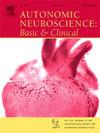Inter-individual variability in muscle sympathetic nerve activity at rest and during exercise: Disconnection with blood pressure
IF 3.2
4区 医学
Q2 NEUROSCIENCES
引用次数: 0
Abstract
Microneurographic recordings of muscle sympathetic nerve activity (MSNA) have provided fundamental insight into sympathetic discharge patterns at rest and during exercise in health and disease. A key feature of MSNA recordings at rest is a large inter-individual variability, even among healthy adults. The physiological consequences of inter-individual variability in MSNA are commonly discussed as being associated with the regulation of resting blood pressure. However, available evidence from large cross-sectional analyses demonstrate a near absence of an association between resting MSNA and blood pressure. Less appreciated, MSNA also exhibits inter-individual variability in response to stress, such as exercise. Again, the consequences of variability in MSNA are unclear and can be dissociated from the blood pressure response, particularly at low-to-moderate intensity muscle contractions for short durations (≤2 min). In this brief review, we summarize several examples of how inter-individual variability in MSNA is unrelated to blood pressure control at rest and during exercise and discuss potential mechanisms responsible for this observation, and key methodological considerations for future study design and interpretation. Additionally, we highlight several unanswered questions that could pave the way for future investigations in the field.
休息和运动时肌肉交感神经活动的个体间变异性:与血压无关
肌交感神经活动(MSNA)的微神经图记录为健康和疾病中休息和运动时交感神经放电模式提供了基本的见解。静息状态下MSNA记录的一个关键特征是个体间差异很大,即使在健康成人中也是如此。个体间MSNA变异的生理后果通常被认为与静息血压的调节有关。然而,来自大型横断面分析的现有证据表明,静息MSNA与血压之间几乎没有关联。较少被重视的是,MSNA也表现出个体对压力(如运动)的反应差异。同样,MSNA变异性的后果尚不清楚,可以与血压反应分离,特别是在短时间(≤2分钟)的低至中等强度肌肉收缩时。在这篇简短的综述中,我们总结了几个例子,说明MSNA的个体间变异如何与休息和运动时的血压控制无关,并讨论了导致这一观察结果的潜在机制,以及未来研究设计和解释的关键方学考虑。此外,我们强调了几个未解决的问题,这些问题可能为未来在该领域的调查铺平道路。
本文章由计算机程序翻译,如有差异,请以英文原文为准。
求助全文
约1分钟内获得全文
求助全文
来源期刊
CiteScore
5.80
自引率
7.40%
发文量
83
审稿时长
66 days
期刊介绍:
This is an international journal with broad coverage of all aspects of the autonomic nervous system in man and animals. The main areas of interest include the innervation of blood vessels and viscera, autonomic ganglia, efferent and afferent autonomic pathways, and autonomic nuclei and pathways in the central nervous system.
The Editors will consider papers that deal with any aspect of the autonomic nervous system, including structure, physiology, pharmacology, biochemistry, development, evolution, ageing, behavioural aspects, integrative role and influence on emotional and physical states of the body. Interdisciplinary studies will be encouraged. Studies dealing with human pathology will be also welcome.

 求助内容:
求助内容: 应助结果提醒方式:
应助结果提醒方式:


